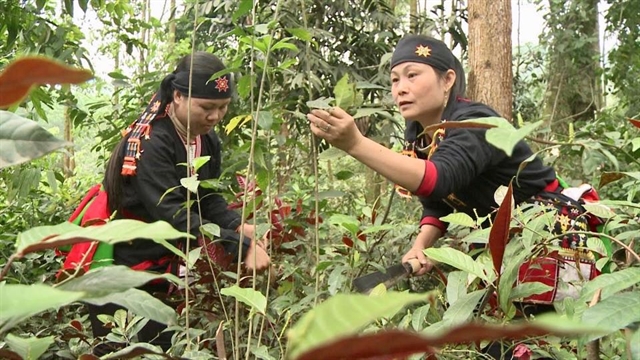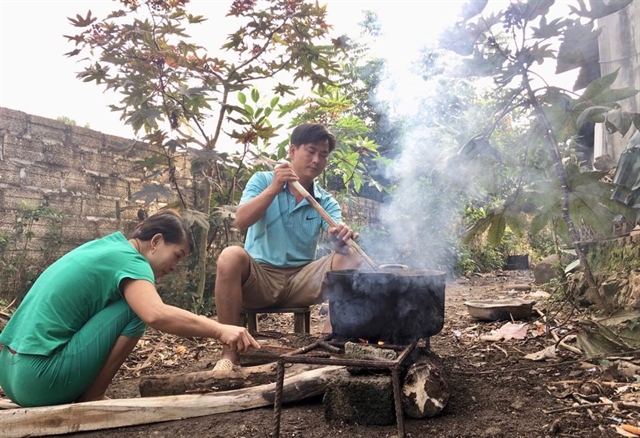 Society
Society

 |
| Dao ethnic women collect medicinal herbs. Photo kinhtedothi.vn |
HÀ NỘI Sitting in a large house, Dương Thị Hiến in Hà Nội's Ba Vì District is preparing herbal medicine for customers in the capital city.
Every day, her husband and two children go to the forest to collect leaves. She stays at home to process and prepare medicine for customers.
Being busy all year round, they have been able to build a new house, thanks to the efforts of the whole family after years of hard work.
Hiến, a member of the Dao ethnic group in Yên Sơn village, Ba Vì mountainous commune, has seen her life improve significantly thanks to medicinal herbs.
Like her, many local residents at the foot of Tản Viên Mountain have seen their lives improve due to the traditional job that has been preserved for hundreds of years.
Lý Văn Phủ, in Yên Sơn village, told Kinh Tế & Đô Thị (Economic & Urban Affairs) newspaper that the area of agricultural land in the village is limited. The income of most of the Dao ethnic group depends on traditional medicinal herbs.
In Ba Vì Commune, the production of medicinal herbs has also developed in Hợp Sơn and Hợp Nhất villages among the Dao ethnic group.
"Medicinal plants have brought income for local inhabitants, helping many Dao ethnic families out of poverty," said Lăng Văn Hà, chairman of Ba Vì District People's Committee.
As of early 2022, the whole commune has only 11 poor households, accounting for 1.8 per cent of the total number of households.
Since 2019, Ba Vì Commune is no longer in extremely difficult circumstances.
Risk of exhausted resources
The profession of the Dao people in Ba Vì also faces many great challenges.
Dương Thị Bình, a 75-year-old woman, said she has been doing this job since she was 11 years old.
Before 1996, the herbs were abundant.
However, the over-exploitation of those plants without preservation and development plans has increased the risk of extinction.
In 1996, Ba Vì National Park was established. It aims to manage, protect and develop natural forests. Since then, the Dao people are no longer free to go into the forest to find and collect medicinal plants.
Secretary of the Party Committee in Hợp Sơn village, Dương Trung Thân said since the 1990s, many Dao ethnic households have tried to breed varieties of medicinal plants.
However, due to limited cultivation techniques, the yield and quality of medicinal plants are not high.
"Many people have to go to Hòa Bình, Phú Thọ, even Lạng Sơn, Hà Giang provinces to find medicinal herbs," Thân said.
Along with the worry that the raw material area is running out, the profession of herbal medicine is also at risk.
 |
| A family in Hợp Sơn village cook plants to make herbal glue. Photo kinhtedothi.vn |
In fact, in Ba Vì Commune, people who still practise traditional medicine are elderly. While the younger generation is all trying to find a livelihood in the city and industrial zones.
Bình has eight children. But until now, no one has followed their mother's job.
Herbal medicine of the Dao people in fact has not attracted many economic sectors, especially enterprises.
The application of technological advances to production is still very limited.
Spontaneous trade and lack of sustainable linkage chains are hindering the development of this traditional medicine.
The Dao ethnic people are trying to change step by step to develop these products.
Many households have turned to processing concentrated herb glue, bringing convenience to consumers, Triệu Thị Chinh, a local producer said.
With the support of agencies in Hà Nội and Ba Vì District, local products are packed and labelled. Customers can easily trace the origin of the product.
Some locals have access to online sales channels, livestreams and work with pharmacies to consume their home-made herbal medicines.
Yên Sơn, Hợp Sơn and Hợp Nhất villages were recognised by the Hà Nội People's Committee as traditional craft villages.
In order to develop herbal medicines, the State needs to have more mechanisms and policies to support farming land and production techniques so that people can preserve and breed precious varieties of medicinal plants which are in danger of being exhausted, said Lăng Văn Hà, chairman of Ba Vì District People's Committee.
He also said that developing community-based tourism in Ba Vì will not only expand exchanges for ethnic minorities, but also more and more people will know about precious traditional medicines, contributing to preserving and promoting the value of herbal medicine of the Dao people.
Regarding the development of traditional herbal medicine of the Dao people, head of the Hà Nội Committee for Ethnic Minorities, Nguyễn Tất Vinh, said the city has recently issued a plan to implement the National Target Programme for socio-economic development in the ethnic minorities and mountainous areas in the capital city in the 2021 - 2025 period.
Accordingly, about VNĐ2,150 billion (US$90.76 million) will be allocated to localities to develop agricultural, forestry production; tourism; traditional trades and craft villages and production of the value chain.
About VNĐ1,500 billion ($63.32 million) will also be invested in building essential infrastructure to serve the life and production of ethnic minorities, including the Dao ethnic community in Bà Vì Commune.
The locality will continue to coordinate with departments and agencies to support organisations and individuals to expand raw material areas; promote preliminary processing of herbal plants in order to market requirements, contributing to improving the income and living standards of the Dao ethnic group, said Secretary of the Party Committee of Ba Vì Commune Dương Trung Tuấn. VNS